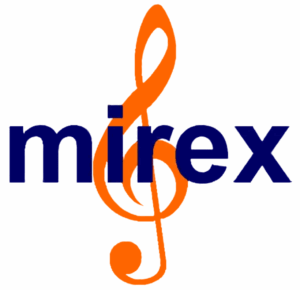 MIREX (Music Information Retrieval Evaluation eXchange) is a prominent evaluation platform in the field of music information retrieval. Researchers are invited to submit novel algorithms for a variety of music-related tasks and receive standardized evaluation results, with the opportunity to present posters during the annual ISMIR conference. For more details on submission, please see the following link:
MIREX (Music Information Retrieval Evaluation eXchange) is a prominent evaluation platform in the field of music information retrieval. Researchers are invited to submit novel algorithms for a variety of music-related tasks and receive standardized evaluation results, with the opportunity to present posters during the annual ISMIR conference. For more details on submission, please see the following link:
- homepage: https://www.music-ir.org/mirex/wiki/MIREX_HOME
- contact email: future-mirex@googlegroups.com
- LinkedIn pages: https://www.linkedin.com/company/future-mirex/
- Discord group: https://discord.gg/vC2YWX29sC
This year, AIM PhD students Yinghao Ma and Huan Zhang introduced new tasks to the platform, including Multimodal Music QA, Expressive Piano Performance Rendering, alongside traditional MIR challenges and emerging understanding/generation tasks. Specifically, we are coordinating the following tasks:
Music Reasoning QA
Task Captain: Yinghao Ma
The MIREX 2025 Music Reasoning Question Answering (QA) Task challenges participants to develop models capable of answering natural language questions that require understanding and reasoning over musical audio. This task seeks to advance the frontier of machine music intelligence by evaluating models on their ability to reason about all kinds of music information musical structure, instrument presence, melody information, vocal content, and environmental context etc., along with knowledge in music theory and music history.
Participants will build systems that answer multiple-choice questions grounded in audio inputs. The task includes questions from four curated subsets (Music, Music-Speech, Sound-Music, Sound-Music-Speech) from the MMAR benchmark, and Music-subset with image caption from the OmniBench benchmark. Each question is paired with an audio clip and 2-4 different choices.
RenCon: Expressive Piano Performance Rendering Contest
Task Captain: Huan Zhang
Expressive Performance Rendering (https://ren-con2025.vercel.app/) is a task that challenges participants to develop systems capable of rendering expressive musical performances from symbolic scores in MusicXML format. We accept system that generate symbolic (MIDI) or audio (wav) renderings, and the output shall contain human-like expressive deviation from the MusicXML score.
Similar to AI song contest, the evaluation of expressive rendering is subjective and requires human judges to assess. Thus, we have a two-phase competition structure: Phase 1 – Preliminary Round (Online) Submit performances of assigned and free-choice pieces. The submission period is open from May 30, 2025 to Aug 20, 2025. After the submission deadline, the preliminary round page will be finalized with the list of participants and their submissions, and the online evaluation will take place. Phase 2 – Live Contest at ISMIR (Daejeon, Korea) Top systems from preliminary round will be invited to render a surprise piece live at ISMIR, using their system in real time. The live contest is open to all ISMIR attendees, as well as the general public. The audience will be able to listen to the live performances and vote for their favorite system.
Audio Beat Tracking
Task Captain: Wenye Ma & Yinghao Ma
The aim of the automatic beat tracking task is to track each beat locations in a collection of sound files. Unlike the Audio Tempo Extraction task, which aim is to detect tempi for each file, the beat tracking task aims at detecting all beat locations in recordings. The algorithms will be evaluated in terms of their accuracy in predicting beat locations annotated by a group of listeners.
Audio Key Detection
Task Captain: Wenye Ma & Yinghao Ma
Audio Key Detection aims to identify the musical key (e.g., C major, A minor) of an audio recording. This involves determining both the tonic (root pitch) and the mode (major or minor) from the audio signal.